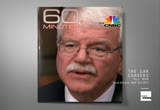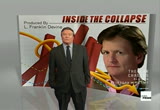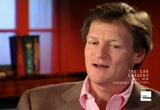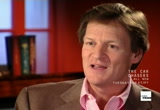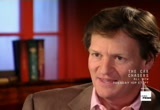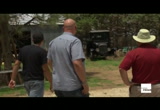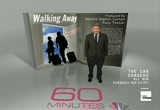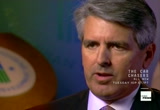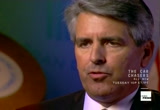tv 60 Minutes on CNBC CNBC October 27, 2013 11:00pm-12:01am EDT
11:00 pm
[stopwatch ticking] >> so you made a ton of money. >> made a ton of money, much more than i ever imagined, you know, i'd ever have. >> incredibly, he made that ton of money during the worst financial disaster since the great depression. [ticking] trillions of dollars have evaporated from 401(k) accounts that had become the primary retirement vehicle for the majority of american workers. >> there clearly has been a raid on these funds by the people of wall street, and it's cost the savers and the future retirees a lot of money that would otherwise be in their account independent of the financial collapse. [ticking] >> amazingly, we have-- 16 out of the 44 houses on this
11:01 pm
street have foreclosed over the last year. >> and yours over here? >> mine will be number 17. >> welcome to 60 minutes on cnbc. i'm steve kroft. the so-called great recession sparked by the financial crash of 2008 continues to impact the business practices of wall street and the lives of americans on main street. this edition examines the seismic shock of the economic collapse on american families and what many of them believed were their most unshakable investment vehicles: their homes and their 401(k) retirement savings plans. we begin today with the culture of wall street and the role that it played in the crash. if you had to pick someone to write the autopsy report on the wall street financial collapse in 2008, you couldn't do any better than michael lewis. he is one of the country's preeminent nonfiction writers with a knack for turning complicated, mind-numbing material into fascinating yarns.
11:02 pm
he wrote his first best seller, liar's poker, about his experiences as a young wall street bond trader when he was still in his 20s. another lewis best seller called the big short: inside the doomsday machine was published in march 2010. it explains how some of wall street's finest minds managed to destroy $1.75 trillion in wealth in the subprime mortgage markets. just before the publication of the big short, we spent two days debriefing lewis at his home in california. >> this was an episode where capitalism was almost destroyed just by the capitalists. and in the most sensational way, they were sort of destroyed by their own folly. >> what happened? >> the incentives for people on wall street got so screwed up that the people who worked there became blinded to their own
11:03 pm
long-term interests, and--because the short-term interests were so overpowering. and so they behaved in ways that were antithetical to their own long-term interests. >> michael lewis, a one-time wonder boy on wall street, is ensconced in this hillside compound in berkeley, california, which has a main house and three cottages, and he is much happier writing about business than actually conducting it. he lives here with his wife, former mtv news correspondent tabitha soren, and their three children: a three-year-old son and two young daughters who he takes to all of cal berkley's women's basketball games. it's one of the few breaks that lewis allowed himself over the past 18 months as he dug into the idiocy and negligence that produced the worst financial crisis since the great depression. >> i'm afraid that our culture will come to the conclusion-- 'cause it's always the easy conclusion--that everybody was just a bunch of criminals. i think the story is much more
11:04 pm
interesting than that. i think it's a story of mass delusion. >> lewis' forte has always been discovering little-known facts and characters that change people's perception about a story. so when he finally sat down at his computer with sacks full of research to write about this calamity, he had no interest in treasury secretary hank paulson or ben bernanke or the ceos of wall street's big investment banks, who he believes had no clue what was going on while it was going on. he wanted to tell the story through the eyes of people who were paying attention and who knew that a financial disaster was inevitable. >> but there were a handful of characters who actually had seen it coming and made a fortune off of it. and there were so few of them, and there were so many people who had been on the other side that i thought--that i kind of wondered who they were and why they got themselves into that position. >> what they saw. >> what they saw. almost more how they saw. >> how many people were there, do you think, in the world
11:05 pm
that understood what was going on? >> between 10 and 20 investors at most, and this is from a universe of tens of thousands of people who could have conceivably made that bet. >> the first one to see that something was seriously amiss in the burgeoning subprime mortgage market was dr. michael burry, a california physician with only one good eye. uncomfortable dealing with patients, burry quit medicine and started a hedge fund in cupertino. beginning in 2003, he turned to something that no one else in america was doing: reading and analyzing the pools of risky subprime mortgage loans that wall street had been buying up and bundling into highly profitable mortgage-backed securities, which they were selling to investors around the world. >> i called up the prospectuses, and i read the prospectuses, and i looked at these pools. i could see the credit standards within these pools deteriorating just quarter to quarter. >> how could you tell that? >> there was essentially crappier mortgages being put into these pools, and it didn't
11:06 pm
seem investors seemed to care, and it didn't seem the ratings agencies seemed to care. >> do you think many people read these prospectuses? >> i think the lawyers that put them together...[laughs] to an extent, maybe. >> do you think the executives at the big wall street firms who were issuing these bonds had read them? or understood them? >> i don't think they read them, no. i think that there were probably junior analysts that were given the task of reviewing these--these documents. however, i think that this was a profit center. it was a profit center. it was something the organization wanted to do. >> what you were doing sounds to me like the job that the rating agencies should have been doing. >> there's no way the ratings agencies had anywhere near the manpower to look through all that was being issued. >> yeah, but you're one guy, and you found it.
11:07 pm
>> you would think that even if they just looked at a sample, maybe they would have come to a realization. >> by 2005, michael burry had come to the realization that the wall street bond market had lost its mind. it was buying up hundreds of millions of dollars in dicey loans to unqualified buyers who were, in michael lewis' words, "one broken refrigerator away from default." burry concluded that the subprime market would collapse in 2007. >> he notices for the first time that there are pools. there are mortgage bonds supported by pools of loans, and most of the loans are what-- are called negative amortizing interest-only loans, which means that, you, the homeowner and buyer, you borrow the money, and you not only don't have to repay your principal; you don't even have to repay the interest. and if you just don't pay anything, they just add to your loan. >> so you can't lose your house. >> you can't lose your house, right, in theory, right. and so he figures we've reached
11:08 pm
the end of the road in the insanity of lending. they're scraping the bottom of the barrel. now is the time to lay a bet. and it's before anybody does. >> burry figured out that these mortgage-backed securities would become worthless if just a small percentage of the dicey loans went bad, and he wanted to bet against the worst of them. he decided that the best way to do it would be to get wall street to sell him inexpensive insurance contracts on the securities that would pay off big-time if they failed. the contracts were called credit default swaps. >> he conceives that they are going to invent on wall street credit default swaps on subprime mortgages--essentially, insurance contracts on the bonds--before they even do. and he helps--he participates in the creation of this instrument, and michael burry is the first one in. >> burry assumed a lot of people would figure out what he was up to but very few did. it took two years for the drama to play out, but the subprime mortgage market finally collapsed in 2007, just as he had predicted.
11:09 pm
so you made a ton of money. >> made a ton of money, much more than i ever imagined, you know, i'd ever have. [ticking] >> when we come back, a look at the wall street bonus culture and why michael lewis thinks it's become unsustainable. >> wall street is able to delude itself because it's paid to delude itself. >> when 60 minutes on cnbc returns in a moment.
11:10 pm
[poof!] [clicks mouse] there's doughnuts in the conference room. there's doughnuts in the conference room. automatic discounts the moment you sign up. [ male announcer ] when we built the cadillac ats from the ground up to be the world's best sport sedan... ♪ ...people noticed. ♪ the cadillac ats -- 2013 north american car of the year. lease this cadillac ats for around $299 per month with premium care maintenance included.
11:11 pm
transit fares! as in the 37 billion transit fares we help collect each year. no? oh, right. you're thinking of the 1.6 million daily customer care interactions xerox handles. or the 900 million health insurance claims we process. so, it's no surprise to you that companies depend on today's xerox for services that simplify how work gets done. which is...pretty much what we've always stood for. with xerox, you're ready for real business.
11:12 pm
>> wall street organized itself so people were paid to see something other than the truth, and that's one of the central messages of the story. you have to be very careful with how you incentivize people, 'cause they will respond to the incentives. >> and all of the incentives in wall street's largely unregulated bond market were geared toward keeping the subprime money machine humming. wall street's most influential investment bank convinced the financial products division
11:13 pm
of insurance giant a.i.g. to join the party, a decision that would destroy the company. >> they insured tens of billions of dollars of subprime mortgage loans without even knowing they were doing it. goldman sachs persuaded them to insure these piles of loans without them ever investigating what was in the pile. so there's an additional level of incompetence. they didn't even know the mistake that they were making. >> over a period of just a few months in 2005, goldman sachs got a.i.g. to insure $20-billion worth of subprime mortgage securities that the rating agencies had graded aaa. but in fact, lewis says, the pools contained some of the worst "drek" on the market. do you think the big banks like goldman sachs played a.i.g. for a patsy? >> that's exactly what they did. >> lewis calls the goldman sachs-a.i.g. deal one of the original sins of the looming financial crisis. other wall street firms were so jealous of the goldman deal;
11:14 pm
they got a.i.g. to insure another $30 billion of what turned out to be worthless securities. but lewis thinks the fiasco had more to do with wall street's stupidity than corruption. didn't understand these things. >> not well enough. they--they... i mean, there's a wonderful little vignette in the big short about a leading bond trader. he was subprime mortgage bond trader at morgan stanley, a fellow named howie hubler, who manages to lose somewhere between--it's hard to know-- but $7 billion and $12 billion in a matter of six or eight months, more than any single trader has ever lost in the history of wall street, and no one knows his name. >> according to lewis, at the end of 2006 and the beginning of 2007, when the commercial bank j.p. morgan became the first to recognize the danger and fled the subprime market, hubler was gobbling up $16-billion worth of subprime mortgage bonds that would be worthless in nine months. >> he did not understand the forces at work in his own market, and he was supposed
11:15 pm
to be the smart guy. i mean, what were the dumb guys doing? so i think that it's really clear that the firms themselves did not understand the machine they created. >> what happened to howie hubler? >> he's allowed to resign from morgan stanley, and he takes with him millions of dollars in back pay, tens of millions of dollars in back pay. it was all hushed up, basically. >> did most of the people who made these terrible decisions leave with a lot of money? >> yes, they all did. i did not--i haven't run across a single character who didn't get rich. anybody above a certain level in all these firms made huge sums of money by any standard. and the people who were-- i mean, this is where it gets a little creepy. the people who were most instrumental in building the subprime mortgage machine also happened to be the ones who had the most detailed understanding now of the securities in the rubble.
11:16 pm
and they're being paid all over again to sort through the mess, because they're the experts. that is an age-old trick on wall street, 'cause generally speaking, people who create disasters make a lot of money cleaning up the disaster, because they're the ones who know about the disaster. >> by the fall of 2008, with a.i.g. and all of the big investment banks at some risk of going under, the government stepped in to bail out the very firms that had caused the crisis. a decision was made that a.i.g. was too big to let fail and that its gambling debts would be paid off 100 cents on the dollar, and the company that benefited the most was goldman sachs. do you believe it had anything to do with their political connections? >> it's hard to know. there's no proof. but it certainly didn't hurt. it certainly didn't hurt that the secretary of the treasury was a former goldman ceo. it certainly didn't hurt that a lot of the people at the table were former goldman employees.
11:17 pm
it certainly didn't hurt that the air that everybody breathed contained the assumption that we can never do anything to harm goldman sachs. so, sure, i mean, i can't really see how their political influence didn't have anything to do with it. >> once the government decided the banks were too important to fail, lewis says the only way to get them back on their feet was to give them money. >> i think they assumed that in response for this gift of life that they were giving these wall street firms, the people who ran the wall street firms would behave responsibly, in a way that didn't attract the attention-- >> meaning what? >> meaning, not pay themselves huge sums of money, perhaps not even pay themselves ythi just say thank you and rejigger their compensation systems. instead, they did not. instead, they used the market as an excuse for paying themselves. "if we don't pay our employees of goldman sachs huge sums of money, they're gonna leave
11:18 pm
and go to j.p. morgan." and the j.p. morgan people say, "well, if we don't pay these special people huge sums of money, they're gonna leave and go to goldman sachs." and you kind of want to back away from it and say, "well, wait a minute. why are they so valuable in the first place?" >> did they deserve all that money? >> on wall street, the business has become very obviously divorced from productivity, from productive enterprise. so in that sense, no, they don't deserve it. they didn't earn it. what they did was finagle it. they managed--they were very good at putting themselves in the middle of large financial transactions that probably shouldn't have happened in the first place and taking out little pieces of it. they generated trillions of dollars of subprime mortgage loans that should never have been made. but the world would be better off if that whole industry had never existed. so that's crazy. >> lewis says the more people learn about what happened, the angrier they become.
11:19 pm
what about reform? i mean, do you see anything-- you see anything happening? >> there are several things that obviously should be done that have not been done. and you can't explain to my mother why they haven't been done. only a really smart person on wall street can explain why they haven't been done. but for example, all right, one of the things at the bottom of this crisis, we had these ratings agencies that called a lot of things aaa gold-plated securities that were worthless. and the ratings agencies are paid, of course, by the wall street firms for their ratings. why is that allowed? why can you buy a rating? that seems like a very obvious thing to change. and people talk about it, but it hadn't happened. credit default swaps, insurance contracts that we trade freely, but it's not classified as insurance. this market is the closest thing to sort of ground zero of the recent calamity. and yet nothing has been done to change the market.
11:20 pm
nothing's been done to make it more transparent. nothing's been done to make it more like what it is: an insurance market. that's an obvious reform. from the time i was at salomon brothers, it was incredible to me that the firm could advise customers what to buy and sell. at the same time, they are betting on the things that they're trying to sell their customers. so i might call you up and say, "wow, these subprime mortgage loans, they look really, really good. this pile over here, you oughta invest in that pile." and meanwhile, the traders behind me are betting against it. >> lewis believes the financial industry is living in a world so disconnected from american life that it can't be sustained. he thinks it may take a while, but he believes that wall street as we know it has done itself in. >> the leaders on wall street completely lost any sense of their responsibility to the society. and if you know you're gonna
11:21 pm
blow up a.i.g. by putting $20 billion of a bad subprime mortgage risk into it, even though it's gonna be very profitable for you, you should stop and say this shouldn't be done. >> the big short proved to be another big book for michael lewis, gaining best seller status and being named to several lists of the best books of 2010. dr. michael burry, who predicted the collapse of the subprime market, has been a vocal critic of former fed chairman alan greenspan. in a new york times op-ed page piece in april of 2010, burry rejected greenspan's claim that everybody missed it in regards to forecasting the financial meltdown. burry wrote that greenspan, "should have seen what was coming and offered a sober, apolitical warning. everyone would have listened. when he talked about the economy, the whole world hung on every single word." [ticking] coming up, the housing math
11:22 pm
of strategic default. >> you could afford to stay here, correct? >> i could, yeah. it's almost like the "in" thing to do right now, it seems like. >> walking away when your home is underwater, next when 60 minutes on cnbc returns. when you have diabetes like i do, you want a way to help minimize blood sugar spikes. support heart health. and your immune system. now there's new glucerna advance with three benefits in one. [ male announcer ] new glucerna advance. from the brand doctors recommend most. [ passenger ] airport, please.nks ] what airline? united. [ indian accent ] which airline, sir? [ passenger ] united. whoa taxi! [ british accent ] what airline, then?
11:23 pm
[ passenger ] united. all right. [ spanish ] what airline? [ passenger ] united. ♪ [ mandarin ] which airline? [ passenger ] united. [ arabic ] which airline? [ passenger ] united. [ italian ] where are we going? [ passenger ] united. [ male announcer ] more destinations than any other airline. [ thai ] which airline do you fly? [ passenger ] united. [ male announcer ] that's great, big world friendly. ♪ sales event is back. which means it's never been easier to get a new passat, awarded j.d. power's most appealing midsize car, two years in a row. and right now you can drive one home for practically just your signature. get zero due at signing, zero down, zero deposit, and zero first month's payment on any new 2014 volkswagen. hurry, this offer ends october 31st. for details, visit vwdealer.com today. small business owners are using tools like email and social media marketing from constant contact to grow their business.
11:24 pm
11:25 pm
[ticking] >> in the wake of the financial crash of 2008, many homeowners across the country saw the value of their property tumble dramatically. the situation created a new housing trend: a growing number of people who could afford to pay their mortgages began walking away when the value of their homes fell below what they had paid for them. it's called strategic default.
11:26 pm
homeowners have done the math and decided that making those monthly payments is just throwing money away, leaving the mortgage holders-- the banks--as zookeepers of an ever-growing parade of white elephants. as morley safer reported in may 2010, more and more americans who can afford to stay in their homes are simply walking away. >> among them, chris deaner and his wife, dana, of sun city, arizona. west foothill drive has become a street of shattered dreams. >> amazingly, we have-- 16 out of the 44 houses on this street have foreclosed over the last year. >> and yours over here? >> mine will be number 17. >> [squeals] >> when deaner, an auditor for a local university, bought his three bedroom house in 2006 for $262,000, he thought he got a bargain. >> first-time homebuyers, we don't know, you know, houses are overvalued. we just know we need to get in before it keeps going up
11:27 pm
and up and up. >> and then... >> and then...boom. >> the balloon burst. so how much does he think he could get for that $262,000 house today? >> right now, about $142,000. >> that's a big drop. >> big drop, over 43%. >> deaner and his house were, as they say, underwater. with a mortgage of about $1/4 million on a home worth less than $150,000, he has one very expensive lemon. he says he tried to talk his bank into renegotiating his mortgage, but because he earns enough to keep paying, the bank said no deal. >> they refused to. they said it was gonna affect my credit, and they were gonna take my house. and i pretty much said, "go for it." >> but you can afford to stay here, correct? >> i could, yeah. >> but he chose not to. he is walking away. that lemon of a house is now the bank's problem. >> it's almost like the
11:28 pm
"in" thing to do right now, it seems like. >> and because deaner, like many americans, only made a 10% down payment on his home, taking a hike is a lot easier. by law in arizona and nine other states, the bank cannot go after any of his other assets, but his credit rating will suffer. aren't you fearful that you're gonna get a reputation as being a deadbeat? >> yeah. but with the money savings that i will have in four to six years, i'm confident i'll have enough money to buy my way into a house if i wanted. >> so you don't feel any-- even a twinge of guilt? >> no, especially after dealing with my lender, trying to contact them. none at all. >> neither do jean ellen schulik and danny kuehn. they bought their phoenix bungalow three years ago for nearly $400,000. the bank now values it at $85,000. even though they can afford the mortgage payments, they felt they were trying to bail out an ocean with a bucket.
11:29 pm
>> no logical business person would do anything other than walk away. and so there was a lot of soul-searching, and i did a lot of crying, 'cause i'm in love with this house. and every day, i would redo the math and think, "maybe we missed something, you know? this just can't be right." >> but it was. the value of their house was dropping anywhere from $5,000 to $8,000 a month, so schulik and kuehn just felt it was time to walk away. >> i don't think we're villains. we've fulfilled the parts of our contract that we have with the bank. we've let them know what we're doing. it's all legal. it's not anything i ever expected i would be doing, and it sure doesn't feel good, but it seems like it's the right thing to do. >> what do your neighbors make of it? another empty house brings down the value of everyone's house. >> and we've seen that here. i think they will be upset, and i understand that. >> yeah. >> but you're hardly alone in phoenix right now, correct? >> that's true. >> it's interesting; the number
11:30 pm
of my coworkers who have approached me to say, "how are you doing this? because i need to do it." >> the southwest has become an inland ocean of bad mortgage debt. here in arizona, a full 50% of houses are underwater, and next door in nevada, it's even worse. 65% of houses there are drowning, and the water's rising. and it's not just the southwest. more than 11 million homeowners across the country are underwater. it's estimated that number could double in the next year, which means nearly half of all american mortgage holders will owe more on their homes than those homes are currently worth. >> we've been through an event that none of us have ever experienced in this country since the depression. >> to try to stem the tide of foreclosures, the commissioner of the federal housing administration, david stevens, says the obama administration has set aside billions to give
11:31 pm
banks the incentive to help struggling and underwater borrowers with their mortgages. but banks have been slow to modify the terms of those loans. >> the fact of the matter is, these programs are designed to affect those who are most at risk, who are unable to make their payments, and it does require the investor, the servicer, to participate. >> the decision to walk away from the sinking home by people who can afford to pay is spreading like a virus, because as one person on the street does it, the next-door neighbor says, "what am i doing? why am i putting all this money into this almost worthless house?" >> the concern has to be-- for someone who's gonna take that move--is that they have to be so deeply in negative equity that they're willing to damage their credit, damage their financial reputation going forward. if you get foreclosed on in your home--you walk away from your mortgage when you could
11:32 pm
have afforded it, particularly-- that's gonna follow that family for years to come. [ticking] >> coming up, should there be shame in strategic default? >> there isn't shame in defaulting. the banks don't feel shame by foreclosing on a person's home. >> so you're saying we should all be acting like bankers. >> sure. i mean, it's--it's a business transaction. >> next when 60 minutes on cnbc returns. man: sometimes it's like we're still in college. but with a mortgage. and the furniture's a lot nicer.
11:33 pm
and suddenly, the most important person in my life is someone i haven't even met yet. who matters most to you says the most about you. at massmutual we're owned by our policyowners, and they matter most to us. as you plan your next step, we'll help you get there. (vo) you are a business pro. maestro of project management. baron of the build-out. you need a permit... to be this awesome.
11:34 pm
11:35 pm
11:36 pm
the consequences are overblown. >> people think that if they're late on their payment or they defaulted that a sheriff is gonna come the next day and rip them out of the home. what we do is offer people a peace of mind right away that they know that's not going to happen. >> i'm gonna be here for you throughout the entire time, so you can always call... >> the website urges underwater homeowners to "unshackle themselves" from their mortgage obligations and, for a price, walks them through the process of walking away. ruyle says his greatest challenge is convincing people that they are not immoral. >> the biggest concern people have, our customers have, is the stigma of foreclosing and what will the neighbors think. but as more and more people are foreclosing, that stigma is wearing off. people are realizing now that there isn't shame in defaulting. the banks don't feel shame by foreclosing on a person's home.
11:37 pm
>> so you're saying we should all be acting like bankers? >> sure. i mean, it's--it's a business transaction. >> big businesses make such bottom-line decisions all the time. morgan stanley walked away from five san francisco office buildings they bought at the height of the boom. and real estate developer tishman speyer defaulted on the huge $5.4-billion stuyvesant town apartment complex in new york city when its value fell by nearly half, making it one of the biggest walk-aways in real estate history. it's a trend the banks fear could catch on with average homeowners. no bank we contacted would talk publicly about strategic defaults, but all indicated they'd be unwilling in most cases to help underwater homeowners who can afford to keep up their payments. and commissioner stevens agrees with the banks. >> to simply allow anybody who just decides they don't want
11:38 pm
their home anymore, who signed a contract to purchase a home, to walk away and get some sort of write-off with a program backed by the administration or a financial institution creates a whole new set of standards that will live with us for years to come. the question is, who pays that bill? >> for now, that bill is being paid by people like businessman tom hansen of scottsdale, arizona. he bought his dream house on gold dust avenue five years ago. much of the gold has evaporated, and he is left with a pile of dust. >> i paid $1.2 million for the house. >> what's its value today? >> $850,000, if you can sell it. [laughs] >> while his friends are urging him to unload that monkey on his back, hansen just can't bring himself to do it yet. >> i just would not be comfortable walking away. and so, you know, maybe at some point in time, i will walk away.
11:39 pm
but right now, i'm not. >> what you're saying is, it really comes down to conscience. >> i think it does. >> i mean, you are attached to the house, correct? i mean, it's not-- >> oh, i am. i love the house. so i'd have to go find a house that i liked better. >> it's an expensive love affair. >> aren't they all? [laughter] >> but the deaners, who stopped paying their mortgage five months ago, plan to stay in their house for free until the bank forecloses in july. then with all the money they save, they plan to rent a nicer, cheaper house for a few years while his credit recovers. you know, there are people saying, "if everybody did what you're doing, the country would be in even bigger, deeper trouble than it is right now." >> if that starts happening, that's for the professionals to figure out. >> so you don't feel any responsibility for it? >> unfortunately, no, i don't. >> in our next story, we look at
11:40 pm
how the 2008 financial crisis impacted another pillar of american retirement investment: the 401(k) plan. in the wake of the wall street collapse, trillions of dollars evaporated from those accounts, the prime source of retirement funds for a majority of american workers, affecting their psyche and their future. the consequences for many were dire. in april 2009, i reported on the shortcomings of a retirement system that's jeopardized the financial security of tens of millions of people. it was a gray, chilly morning in midtown manhattan, and a line of unemployed, mostly white-collar workers stretched for blocks around the radisson hotel. more than 1,000 middle managers, stock brokers, consultants, secretaries, and receptionists had come here hoping to find a job. >> if you are just arriving, please step this way. >> good morning. >> morning. sign your name. >> it was called a career fair, but there was no merriment here,
11:41 pm
only a whiff of desperation. >> do you have any openings in the i.t. department? >> many of these people had been out of work for months and burned through their liquid assets. their future, even bleaker than the present. alan weir, who turns 60 this month, showed us his latest 401(k) statement, which he hadn't had the courage to open up. >> i'm afraid. >> you gonna open it now? >> you want me to? let's do it. >> there's good reason for his trepidation. nearly half of his life savings have vanished in a matter of months. >> it went down again. >> how much are you down overall? >> oh... about $140,000. >> do you think you'll ever get it back? >> i mean, i'll probably never see it come back. i was looking to retire, probably, when i hit 62. can't do it now. i'll probably be working until i'm at least 70. >> i'm a microsoft office diva. >> until she lost her job, kathleen coleman had spent nearly 30 years working as an executive assistant
11:42 pm
on wall street. she doesn't have much to show for it. >> tell me about your 401(k). >> um, does this answer the question? >> this is what it was in 2005, 2007. you're down below 2005. >> right. and another one went down almost $40,000. one was $80--$88,000. and then--and then it went down to, like, $50,000. >> how old are you? >> 54, and i live alone. i don't have any children. i've been a career girl all my life, and it's been a great career, and i don't deserve this. i'm sorry. >> it's all right. >> [sighs] >> have you had any nibbles? >> all the nibbles i've had, i get beat out by top models who can type. and i have experience and dedication and loyalty, and i can make any boss shine. i can, if you're out there,
11:43 pm
i'll relocate anywhere for you. >> what--psychologically, what does this piece of paper do to you? >> oh, it crushes any rest i may get when i'm 65. i'll have to work for the rest of my life. >> the saddest part of this story is that it's being repeated all over the country. in eastern pennsylvania, 59-year-old iris hontz lost her accounting job and half of her 401(k) investments. she's now back in the workforce as a part-time cashier in a grocery store. >> your debit card. you have a great day. >> in dearborn, michigan, terry and donna mcnally are barely holding on. he lost his sales job in august. the condo they bought 15 years ago is worth less than their mortgage, and 40% of his 401(k) retirement savings is gone. donna is the main provider now... >> let me hear you count to ten. can you count to ten? >> one, two, three... >> running a day care center out of their home. >> both: seven, eight, nine, ten!
11:44 pm
>> are you here for joan? >> yes. >> terry considers himself fortunate to have found part-time work greeting the bereaved at a funeral home and making lattes at starbucks, >> it's tough, but i'm proud of him at his age to be doing what he's doing. >> the 401(k) drop was tremendous and is tremendous at this point in time. and that's where the savings was, you know? that's our hurt right now. >> we can't live our vision of our dream of retirement. that's the worst part. many people can't. [ticking] >> coming up, the 401(k) lobby says the plan is not the problem. it has let down tens of millions of people at the time they need the money the most. >> that's not a 401(k) problem. that is our entire investment system. this is about, the markets went down for everybody. nobody was saved in the current--in the current thunderstorm. >> next when 60 minutes on cnbc returns.
11:46 pm
do more with less with less energy. hp is helping ups do just that. soon, the world's most intelligent servers, designed by hp, will give ups over twice the performance, using forty percent less energy. multiply that across over a thousand locations, and they'll provide the same benefit to the environment as over 60,000 trees. that's a trend we can all get behind. ...amelia... neil and buzz: for teaching us that you can't create the future... by clinging to the past. and with that: you're history. instead of looking behind... delta is looking beyond. 80 thousand of us investing billions... in everything from the best experiences below... to the finest comforts above. we're not simply saluting history...
11:47 pm
we're making it. but at xerox we've embraced a new role. working behind the scenes to provide companies with services... like helping hr departments manage benefits and pensions for over 11 million employees. reducing document costs by up to 30%... and processing $421 billion dollars in accounts payables each year. helping thousands of companies simplify how work gets done. how's that for an encore? with xerox, you're ready for real business.
11:48 pm
>> ♪ the itsy-bitsy spider >> what kind of a retirement plan allows millions of people to lose 30% to 50% of their life savings just as they near retirement? david wray, president of the profit sharing/401(k) council of america and a lobbyist for the 401(k) industry, says it's one that empowers people to make their own investment decisions. >> 401(k) is the absolute best
11:49 pm
way people can save for retirement. they absolutely are the best retirement vehicle we have. >> how can you say it's the best available if it has let down tens of millions of people at the time they need the money the most? >> that's not a 401(k) problem. that is our entire investment system. this is about, the markets went down for everybody. nobody was saved in the current--in the current thunderstorm. >> wray says that many people still have more money in their 401(k)s than they've actually contributed. he says everyone had multiple investment options, including low-yield guaranteed returns. and he believes people who lost money have no one to blame but themselves. >> in america, it's a society based on freedom and choice and personal responsibility. we need to help them understand these responsibilities and execute them to the best they can. 401(k) is part of that. there are no guarantees. >> what about the people who are 63 or 64? a lot of those people were thinking about retiring... >> well-- >> and now they aren't. >> well, i mean-- >> a lot of them were retired
11:50 pm
and have to go back into the workforce. >> well, but that was not a 401(k) problem; that's an investment system problem. the markets go up and down. and if those people chose to take equity risk, there was a logical outcome. >> but in fact, the 401(k) plans that have become the primary source of retirement income for 60 million americans were never designed to be retirement plans in the first place. they were created in the late 1970s as a savings plan and tax shelter for ordinary americans. the idea was that workers would make voluntary contributions and employers would match a portion of them. the taxes would be deferred until the employee reached the age of 59 and 1/2. it was supposed to supplement the two traditional income streams for retirees: social security and pensions, one leg of a three-legged stool that would support american workers into their golden years, but it didn't turn out that way. >> the three-legged stool, if you will, has gone to two
11:51 pm
legs, and it's wobbly. and it's wobbling, and i'm not sure that it's gonna support anything. and that's the scary part, and people are afraid. >> brooks hamilton has helped design retirement plans for some of the country's largest corporations. he says 401(k)s turned out to be so much cheaper than funding pensions, that many companies decided to freeze their pension plans and replace them with 401(k)s. the decision created millions of new employee investors for wall street and the financial community, and they pounced on the opportunity. >> if you go back and track the mutual fund growth and assets, and you track the growth in 401(k) plans, it looks like a railroad track leading to the sky. they are parallel tracks. >> so the big beneficiaries were the mutual funds. >> that's right. that's correct. >> when employers began turning 401(k)s into retirement plans, the financial community was not shy about promoting them as such.
11:52 pm
the prospect of trillions of dollars in the hands of unsophisticated investors opened the door for all sorts of potential abuses. >> the fact is that the typical 401(k) investor is a financial novice. they don't know a stock from a bond. and we give 'em a list of 20 or 30 mutual funds with really, really powerful names, you know? they sound like, "gee, that's where i want to have my money." >> what are the--generally, the quality of the mutual funds in 401(k) plans? >> mediocre. i'm gonna be real honest with you. with half the funds on the list--really dogs, what people would characterize as dogs-- shouldn't be on the list to start with. >> there clearly has been a raid on these funds by the people of wall street, and it's cost the savers and the future retirees a lot of money that would otherwise be in their account independent of the financial collapse. >> representative george miller of california is chairman of the house committee on education and labor and a staunch critic of the 401(k) industry, especially its practice of deducting more
11:53 pm
than a dozen undisclosed fees from its clients' 401(k) accounts. >> now you got a bunch of economic wizards jumping in and taking money out of your retirement plan, and they don't want to tell you how much. you can't decipher it in simple english, and they're not interested in disclosing it or having any transparency about it. >> and most of the people that look at their 401(k)s have no idea that these fees are being taken out. >> no. where would you find it? where would you find these fees in this prospectus? you can look on any page you want, and when you're all done reading it--and you will find some of the fees and the commissions here, but you won't find them all, and i bet you won't find half of them. >> there are legal fees, trustee fees, transactional fees, stewardship fees, bookkeeping fees, finders' fees, and the list goes on and on. miller's committee has heard testimony that they can eat up half the income in some 401(k) plans over a 30-year span, but he has not been able to stop it. >> we tried to just put in some disclosure and transparency in these fees,
11:54 pm
and we felt the full fury of that financial lobby. >> david wray, a lobbyist for the 401(k) industry, says he favors disclosing the fees, but his partners in the financial industry don't. >> do you think most people know these fees exist? >> i think they know that there are fees. they don't know exactly how large they are. >> why do you think the financial services industry is opposed to fee transparency? >> i don't know that they're opposed to it. i think the issue is that-- >> you don't think they're opposed to it? >> well, they want to keep things-- >> you're a lobbyist in washington, right? you know they're opposed to it. >> um... the... >> george miller hasn't been able to get a bill to the floor. >> i think they want to keep the systems as simple and not make changes. they like the way things are. and whenever you push people out of their comfort zones, you know, it's an issue. >> i mean, they're comfortable with the situation because they're making a ton of money or they have made a ton of money. >> well, and their systems are set up in certain ways. you know, this is gonna be a big change.
11:55 pm
>> we wanted to ask david wray, who's been so bullish on 401(k) plans, one last question about what the future holds for people like terry and donna mcnally and kathleen coleman, who you met at the beginning of this story. >> dedicated, loyal. i can be there. there's nothing standing in my way. >> thanks. >> thank you. need a babysitter? [laughter] >> most of the people that we've talked to who are 50 and 60 years old... >> right. >> and have sustained these losses say there is no way they're ever gonna make them back. >> right. >> do you agree with that? >> i think we have to be truth tellers. i think that when a person has hit this point, and we've had this unfortunate situation, i don't think we can misrepresent what the possibilities are. >> and reality is, that money's not coming back that they've lost. >> they can't count on it. they have to--it may. maybe they have long--maybe if they work ten more years, it'll come back by the-- but it's important that they not
11:56 pm
have unrealistic expectations. >> george miller lost his house chairmanship as a result of the 2010 elections. miller, though, remains a staunch critic of the 401(k) industry and continues his crusade against the hidden fees charged to 401(k) investors. that's this edition of 60 minutes on cnbc. i'm steve kroft. thanks for joining us. captioning by captionmax www.captionmax.com and this will be your premium right here. sorry to interrupt, i just want to say, i combined home and auto with state farm, saved 760 bucks. love this guy. okay, does it bother anybody else
11:57 pm
that the mime is talking? frrreeeeaky! [ male announcer ] bundle home and auto and you could save 760 bucks. alright, mama, let's get going. [ yawns ] naptime is calling my name. [ male announcer ] get to a better state. state farm. a confident retirement. those dreams, there's just no way we're going to let them die. ♪ ameriprise advisors can help keep your dreams alive like they helped millions of others. by listening. planning. working one on one. that's what ameriprise financial does. that's what they can do with you. that's how ameriprise puts more within reach. ♪ ♪ [ male announcer ] more room in economy plus.
11:58 pm
more comfort, more of what you need. ♪ that's... built around you friendly. ♪ you want a way to help bminimize blood sugar spikes. when you have diabetes like i do, support heart health. and your immune system. now there's new glucerna advance with three benefits in one. [ male announcer ] new glucerna advance. from the brand doctors recommend most.
11:59 pm
[ male announcer ] harvey's "i'm so happy you're home" dance? that's real love. and so is giving him real tasty food. now there's new so good! dog food from iams. some leading brands contain sugar, or dyes, or artificial preservatives. ♪ [ dog whimpers ] but so good! from iams has 100% wholesome ingredients and none of those other things. now that's real love. and so is that. new so good! from iams. learn more at iams.com.
12:00 am
>> in the christmas retailers have been dreaming about, shoppers start spending again to put some cheer back into a holiday season that's unfolding at the end of an economic crisis. in reality, with their savings diminished, their jobs on the line, any big spenders here are more likely to be demanding deep discounts, and some won't be buying anything at all, because
134 Views
IN COLLECTIONS
CNBC Television Archive
Television Archive  Television Archive News Search Service
Television Archive News Search Service 
Uploaded by TV Archive on

 Live Music Archive
Live Music Archive Librivox Free Audio
Librivox Free Audio Metropolitan Museum
Metropolitan Museum Cleveland Museum of Art
Cleveland Museum of Art Internet Arcade
Internet Arcade Console Living Room
Console Living Room Books to Borrow
Books to Borrow Open Library
Open Library TV News
TV News Understanding 9/11
Understanding 9/11
